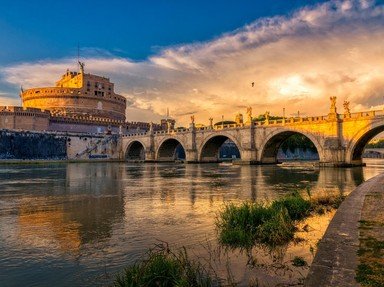Quiz Answer Key and Fun Facts
1. Rome was founded according to legend on April 20th, 753 BC. It is of course quite impossible to set an exact date for the founding of the Roman city, but many historians think that Rome arose around 500 BC.
Shortly after the founding of Rome, there would have been a shortage of (fertile) women. The Romans would have then invited a neighbouring tribe to a magnificent banquet, and kidnapped all marriageable women. What was the name of the tribe that would have remedied in this unusual manner the shortage of women? Pietro Agostini named an opera after this historical (or legendary?) episode in 1680, and many baroque painters have made a tableau out of it.
2. As in many ancient cultures, religion played a major role in Roman society. Priestesses dedicated to the goddess of the hearth were probably the women who were bestowed the greatest esteem. But a girl couldn't become such a priestess without swearing an oath of chastity. Who were these priestesses, who inspired Gaspare Spontini for his opera first performed in 1807?
3. Mozart composed in 1772 an opera about one of the greatest Roman republican generals, who won eternal fame for his victory against Carthage. Who was this general, member of one of the best known Roman families?
4. Johann Hasse completed in 1731 an opera named after a Roman senator greatly admired by Dante Alighieri. This senator (95 BC-46 BC) chose Pompey's party against Julius Caesar. When he saw Caesar would win the civil war, he committed suicide. Who was this senator?
5. Probably the most important Roman general and conqueror inspired Gian Francesco Malipiero's 1936 opera. Who was this general, born in 100 BC?
6. Alessandro Scarlatti named an opera completed in 1703 after an enemy of Rome who managed to defeat three legions in one single battle (near the Teutoburg Forest). Who was this leader of the Cherusks?
7. George Frederick Handel (Georg Friedrich Händel) named an opera composed in 1710 after the fourth wife of the Emperor Claudius. She was also the mother of Claudius' successor Nero. What was her name?
8. One of the last operas composed by Mozart deals with the tenth Roman Emperor (79AD-81 AD), who completed the Colosseum. What was his name?
9. Edward Bulwer Lytton wrote a novel on "The Last Days of Pompeii". Enrico Petrella was inspired by this novel to compose his opera completed in 1858. Petrella named the opera after the female protagonist. Who was she?
10. Giuseppe Verdi was frequently inspired by historical themes. In 1846, he composed an opera named after an enemy of Rome, whose name did cause great fear. Who was this enemy, after whom Verdi named his opera?
Source: Author
JanIQ
This quiz was reviewed by FunTrivia editor
bloomsby before going online.
Any errors found in FunTrivia content are routinely corrected through our feedback system.


